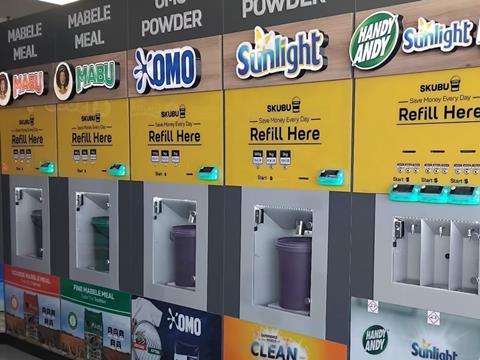
Sonke is dispensing Unilever brands through its first automated refill store in Johannesburg – a development set to lower prices by up to 60% while promoting refill behaviours in local communities.
A study from IUCN suggests that around 35% of the plastic polluting waterways and the marine environment in Southern and East Africa can be traced back to South Africa; this outcome is feared to impact human health, livelihoods, and biodiversity.
Sonke’s SKUBU automated refill store intends to bring affordable products to underserved communities while reducing single-use plastic waste. The start-up has joined forces with the TRANSFORM impact accelerator, in which Unilever, the UK’s Foreign, Commonwealth & Development Office (FCDO), and EY aim to support SMEs and entrepreneurs in testing and scaling new packaging models.
Consumers can now dispense products from Sunlight, Handy Andy, and other Unilever brands into their own containers at bulk prices – a move set to achieve cost savings of up to 60%. The pilot is hoped to improve the convenience and accessibility of refills and encourage sustainability-minded consumption habits.
The SKUBU store’s IoT-enabled technology is also set to benefit retailer employees with live sales tracking, automated replenishment alerts, and real-time stock monitoring – helping keep up with demand for essential goods.
Trained SKUBU ambassadors will be available in-store to help shoppers navigate and use the refill machine.
“For a refill model to scale, it must be accessible, affordable and responsive to the communities they serve,” said Eben de Jongh, founder and managing director at Sonke. “Our collaboration with TRANSFORM in launching SKUBU is critical in our journey to reach this goal.
“By combining technology with onsite support from our ambassadors, we are able to respond to consumer needs in real time, building a refill model that is approachable and fits into everyday life.”
“Not only is Sonke’s store opening a major milestone for the enterprise, but it is also an important step for TRANSFORM,” added Angela Kow, TRANSFORM plastics lead at Unilever. “We’re proud to help pioneering enterprises like Sonke scale refillable packaging models.
“To do this, we need continued cross-industry collaboration and investment in inclusive infrastructure to help these enterprises thrive.”
In previous years, Unilever has worked with Vega Innovations, Bopinc, and Alner to pilot refill solutions at supermarket chains and local markets in Sri Lanka, Bangladesh, and Indonesia, respectively. As well as an overall decrease in flexible plastic sachet consumption, the pilots sought to give consumers access to convenient reuse solutions, and to allow them more control over product quantity and price.
SC Johnson has since installed its first refill machine in North America at London Drugs, a pharmacy and retailer in Canada. Consumers are encouraged to refill reusable products with hand or dish soap from method, Mrs. Meyer’s Clean Day, and other brands – aiming to reduce plastics in retail by up to 93%.
If you liked this story, you might also enjoy:
The ultimate guide to the Packaging and Packaging Waste Regulation in 2025
How are the top brands progressing on packaging sustainability?
Everything you need to know about global packaging sustainability regulation in 2025
The key to increasing the use of reusable packaging in supermarkets













No comments yet